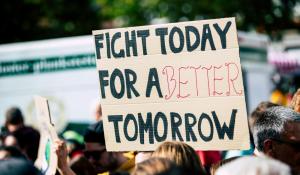
Communities worldwide are facing relentless wildfires, powerful hurricanes, and devastating flooding — the climate crisis is here, and it will worsen unless we act. Fossil fuels combustion is heating global temperatures and energy use causes 73 percent of greenhouse gas emissions. Cutting emissions is possible as we urgently transition from fossil fuel industries to socially just, renewable, clean energy and transportation systems.
Fossil fuels disproportionately harm Black and Brown communities inundated with power plants, oil wells, and other polluting facilities. Transitioning to renewables is critical for the climate and communities, and we need to look deeply at how energy is produced, consumed—and who benefits.
Plug into Clean Energy
In 2019, the Energy Information Administration (EIA) reported that over 11 percent of energy in the United States came from renewable sources, including wind, solar, geothermal, and hydropower. Solar and wind have seen major growth in the past decade and renewable energy consumption has surpassed coal for the first time in over 130 years (burning wood and using hydropower were surpassed in the 1850s)—but we still have work to do.
Electricity generation causes the bulk of emissions from the energy sector and over 62 percent of our electricity comes from fossil fuels. Nuclear energy generates 20 percent and renewables produce nearly 18 percent. COVID-19 has slowed supply chains and new installations for renewables, but demand has held strong and the EIA estimates that renewables are the fastest-growing source of electricity in 2020.
Residential solar grew by over 50 percent between 2010 and 2016, but not across all communities. Racist housing policies have resulted in insufficient public infrastructure for many Black and Latin American communities and rooftop solar access is another extension of that historic injustice.
Community solar projects provide an alternative to rooftop—in this option participants buy shares in a solar facility and receive credits to lower their bills (based on how much that facility sends to the grid), but some areas have enrollment costs which can present barriers for low-income residents. Access to solar can be a benefit particularly for residents who face disproportionately high energy burden—meaning their energy bills cost more than five percent of their income.
Individual Actions
Going green at home can save 1.5 tons of CO2 per year. You can find a database of incentives for installing solar panels and a calculator to estimate your home’s potential savings at dsireusa.org. Green America Business Members CleanChoice Energy and Arcadia Power are both great clean energy provider options that don’t require installations or changes to your utility. Switching to an electric vehicle saves over two tons of carbon emissions per year and going car free can save can save three tons—the equivalent to the carbon sequestered by four acres of forest per year.
Community Actions
Support community solar, where solar panels are concentrated at one location and members each get a share of the clean power produced. Community solar allows for equal access to solar power at a cost that is often discounted from the standard utility rate. Get involved with groups like Solar United Neighbors and Vote Solar to advocate for community solar nationwide.
Advocate for Community Choice Aggregation (CCA), which means municipalities are allowed to purchase power on behalf of all their residents and businesses. This allows for purchasing renewable energy for the entire community at a reduced cost . If you live in the states where it is already allowed (NY, MA, RI, NJ, OH, IL, and CA) you can encourage your area to purchase renewable energy for everyone. In other states, you can join with advocates pushing for CCA.
Fight Dirty Energy and So-Called “Clean” Energy
While wind and solar are the fastest growing energy sources in the US, we’re still one of the world’s leading producers of petroleum and natural gas. Communities are being devastated by fracking and pipelines nationwide. And the Trump administration has rolled back crucial environmental protection regulations subjecting frontline communities to greater risks from methane and coal ash leaks and the impacts of fossil fuel drilling and transportation.
Unfortunately, there are some dirty industries pretending to be renewable. In particular, biomass and waste-to-energy plants often get included in states’ renewable portfolio standards, even though these forms of energy are far from green.
Biomass power, or burning wood or other organic material for energy, is touted as “renewable,” because new trees can be planted. But the clearcutting of hardwood forests in the Southeast destroys ecosystems, and releases huge amounts of carbon. Reforested areas may take decades to sequester the same amount of carbon and turning whole trees into wood pellets for fuel emits CO2 and particulate pollutants, which unjustly burdens nearby frontline communities with noise and air pollution, and threatens the economic sovereignty of local communities.
Waste-to-energy means burning solid waste (trash) to generate energy. It’s classified as “renewable” by twenty-three states, yet the expensive facilities pollute communities, release greenhouse gases, and destroy materials that could be recycled, conflicting with zero-waste efforts. Eighty percent of incinerators are placed in low-income and/or communities of color.
Fighting Dirty Energy Means Joining Your Voice with Individuals Nationwide
Take action with Green America and our allies to oppose pipelines, methane emissions from fracking, and regulatory rollbacks. The Biden-Harris administration will work to reinstate regulations of pollutants and will need strong public support to succeed.
Tell elected officials to adopt 100 percent clean energy commitments, support policies that build local ownership of utilities, and prevent companies from charging customers for fossil fuel infrastructure. See “A Beginner’s Guide to Activism” for tips on how to talk to your elected officials and local candidates.
Power in Numbers: Join local chapters of groups like 350.org , Moms Clean Air Force, Dogwood Alliance, Sunrise Movement, Sierra Club, or local groups fighting fracking, incinerators, or biomass power. These organizations coach their members on how to take part in public hearings, rally support in their communities, and take other actions.
Economic Action: Tell Companies to Use Clean Energy
The four major US telecoms companies–AT&T, Verizon, Sprint, and T-Mobile–collectively use more than 30 million MWh of electric power each year—enough to power all the households in New York City! Since we launched our Hang Up on Fossil Fuels campaign in 2017, telecoms have gone from using less than two percent renewables to nearly 50 percent in clean energy contracts and commitments.
As Green America pushes these companies to reach 100 percent renewables, we will advocate for solutions that push for truly clean energy, and diversity and inclusion in clean energy jobs.
Sign our Hang Up on Fossil Fuels petition and our Cleaner Cloud petition.
Writer letters to companies in any sector and tell them to adopt truly clean energy.







